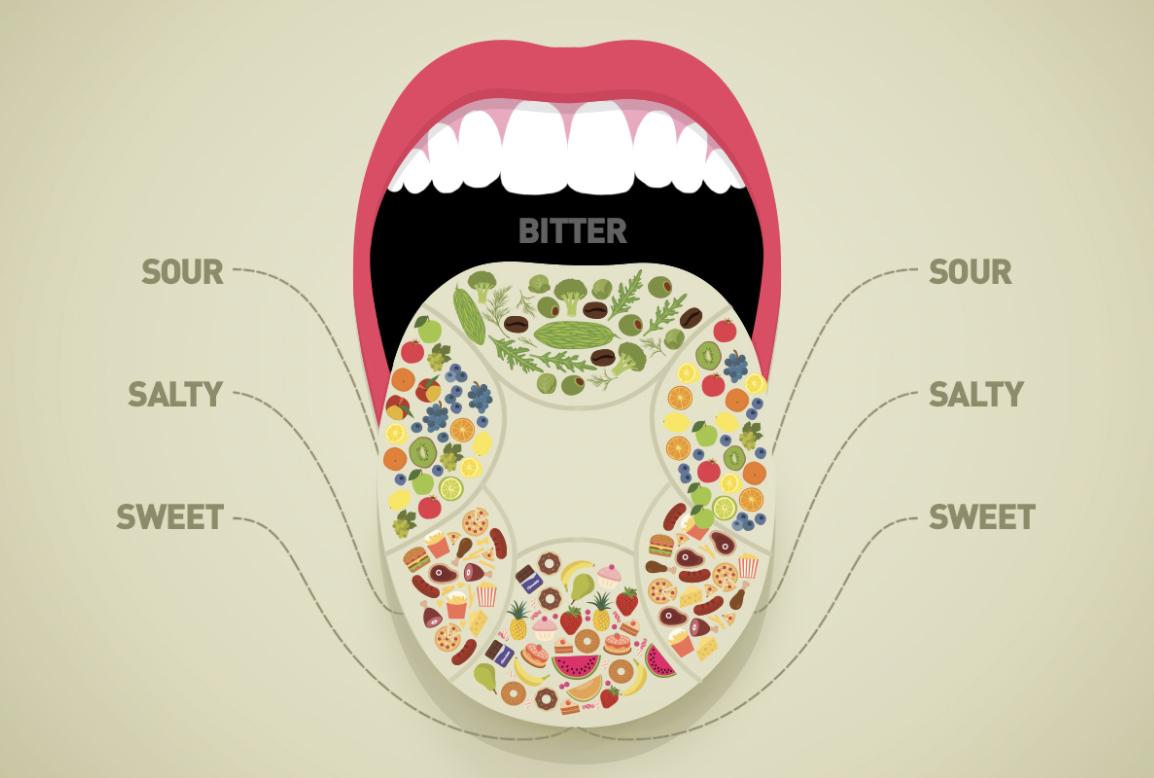I am addicted to sugar, which makes me a little jealous of people who are not, because sugar is not my friend, for health reasons and because it finds its way onto unwelcome parts of my body.
After observing a relative who loved salad (even without dressing!) and had no interest in dessert, I wondered what is going on? Why do some people love sugar and others don’t seem to care? What about cilantro? To some it is delicious; to others, it tastes like burning rubber or soap.
This cannot be a result of conditioning—and it isn’t.
First the basics, our taste buds detect sweet, bitter, salty, sour, and savory (sometimes called “meat”). Temperature is detected by our tongue.
Specific taste preferences arise from many factors…including environment and memory. My mother was a fantastic baker, and we had delicious homemade desserts after every dinner. She baked pies, cakes, homemade ice cream, strudels, tarts, fudge, cheesecake, cookies, puddings…I am feeling deprived just thinking about it. So, at a young age, I developed an expectation and a craving for something sweet after a meal. (The old—”blame it on mom” theory.)
We have 2,000 to 10,000 taste buds, the more that we have, the more sensitive our sense of taste. We even have some in our mouth, throat, and esophagus. (Which explains why we can sometimes taste a bitter pill that gets stuck in our throat.)
Scientists have categorized us into Super-Tasters, Average-Tasters, and Non-Tasters based on the number and concentration of taste buds on our tongues.
Super-Tasters (such as myself) have the most taste buds. About ¼ of the population are Super-Tasters. Tastes are more intense for us, so sweet is an intensely pleasant flavor. We cannot enjoy bitter foods or bitter vegetables such as brussels sprouts, broccoli, or kale. Super-Tasters cannot tolerate spicy foods and have difficulty with bitter beers and high tannin red wines. We add cream to our coffee.
Super-Tasters are the picky eaters in the family. My brothers (who are also Super-Tasters) subsisted on sugary cereals such as Quisp, Quake, and Cap’n Crunch. I was no better. My parents would occasionally require me to remain at the table until I ate everyone on my plate. I spent many hours staring at broccoli, spinach, and other earthy vegetables.
Average-Tasters make up half of the population. They like bitter, earthy vegetables and savory wines. They can taste the same bitter flavors as a Super-Taster; but it is not as intense and therefore not unpleasant. They are also willing to experiment more with foods.
Non-Tasters (which make up about 25% of the population) have the fewest taste buds. Those are the people who can eat very, very spicy foods and often cannot even taste bitterness. Because of their lack of taste buds, they tend to prefer very spicy, hot foods.
If you want to quickly find out what kind of taster you are, put a drop of blue food coloring on your tongue. If your tongue doesn’t get very blue (because it has so many taste buds), you’re probably a Super-Taster. The bluer it gets, the fewer taste buds that you have.
While taste buds play a major role in taste, there are other factors as well.
- Taste buds become desensitized with age, which may explain why we eat things as adults that we didn’t eat as children.
- We taste with our brain which allows taste memories to impact our senses. For example, when we compare a food with the same food in the past; we are using stored memories.
- Some of our taste preferences are genetic. Researchers discovered that a version of the TAS2R38 gene impacted children’s preference for sweet foods. They have recently identified two common gene variants linked to the taste of cilantro.
- We cannot taste what we cannot smell. If our sense of smell is compromised by competing smells (e.g., perfume or cigarettes) or deterioration of the sense of smell (e.g., a cold); the taste will be diminished. For example, olfactory (odor) genes are the predominant genes for determining the taste of cilantro. The smell of salty foods like ham or bacon, can actually make us taste salt.
- Taste buds can be temporarily impacted by previous tastes, for example brushing your teeth. A compound called cynarin in artichokes temporarily blocks sweet receptors.
- Loud, noisy environments (such as airplanes) suppress flavors.
And as for sugar, it turns out there are evolutionary and cognitive mechanisms diabolically contributing to my love of sugar.
- Sugar cravings are an evolutionary preference to ensure that humans ate high energy foods.
- Sugar releases opioids and dopamine in the brain and can cause a brief “high.”
- Some female hormones (e.g., estradiol), significantly increase the desire for sweets.
- And if the collusion of brain chemistry and evolutionary biology was not enough, research shows that eating sweets helps form the memory of the meal; which is why we often remember desserts.
So, there are many forces at work…and all I have to combat them with is willpower.
Hardly a fair fight.
Angela Rieck, a Caroline County native, received her PhD in Mathematical Psychology from the University of Maryland and worked as a scientist at Bell Labs, and other high-tech companies in New Jersey before retiring as a corporate executive. Angela and her dogs divide their time between St Michaels and Key West Florida. Her daughter lives and works in New York City.




Alan Boisvert says
Sugar like cigarettes, alcohol and salt is for morons. Try pure stevia my dear………..
Angela Rieck says
I admire your willpower. Sadly to super-tasters, Stevia has an unpleasant after taste that remains long after the meal is digested…to misquote Shakespeare…the fault is not in the stars, but in our genes.